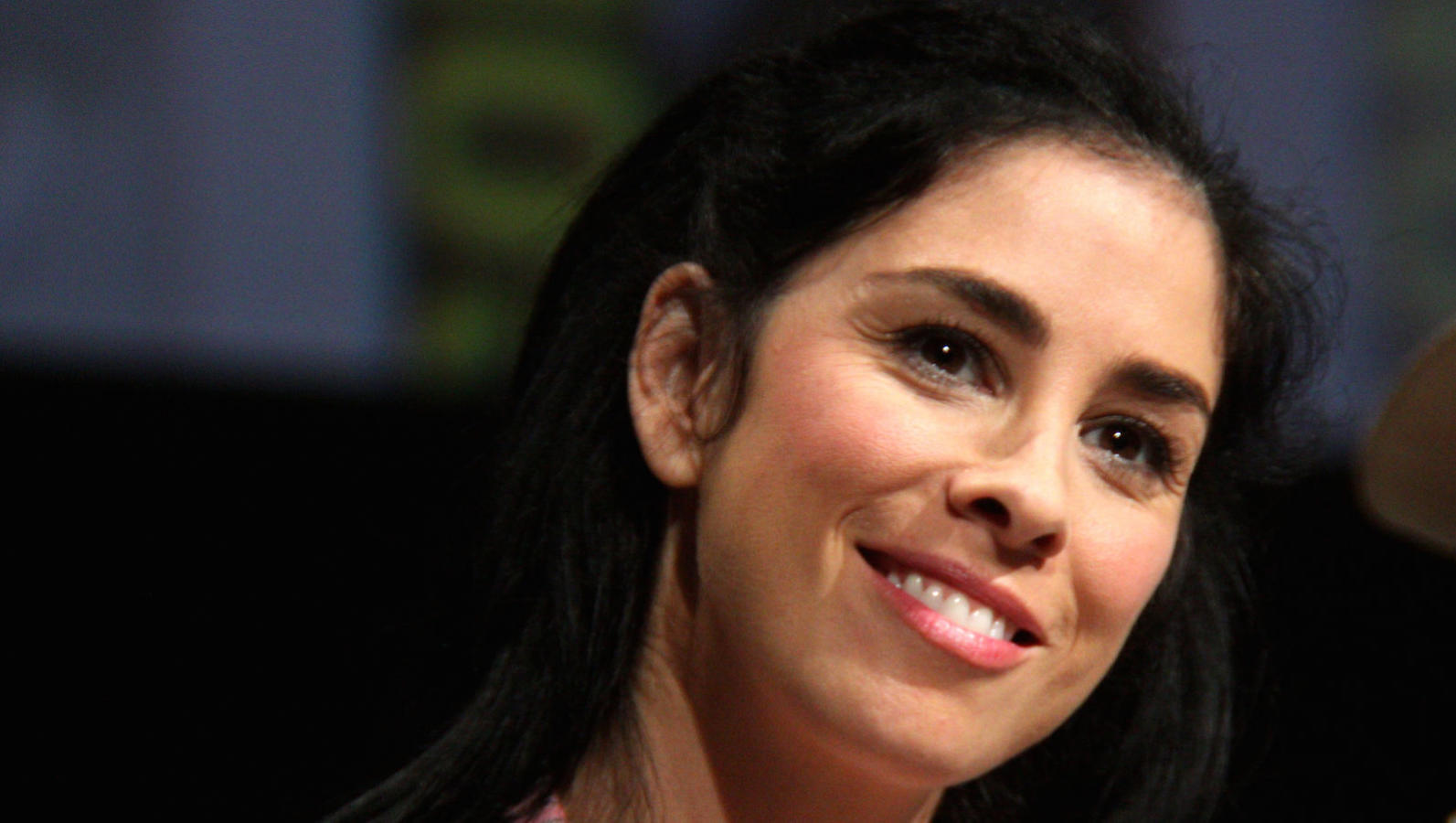Sarah Silverman is familiar with her detractors. Not only does she know who they are, she has a good idea of what they’re going to say about her and her work. They will accuse her of racism, bigotry, and careless stereotyping; they will call her a cheap comic, out for an easy laugh; and they will assail her for her insensitivity. Knowing all this, Silverman’s stand-up act nonetheless sticks with tried-and-true material honed by hundreds of years of American bigotry, whittled down into bite-sized bits of casually tossed-off epithets and disparaging comments.
Note: This article was published in 2007. For up-to-date information about Sarah Silverman and other contemporary Jewish comedians, visit our partner site JTA.
Edgy or Racist?
“Is that an edgy joke, or a racist joke?,” Silverman muses during her 2005 concert film Sarah Silverman: Jesus is Magic after one particular barrage of anti-Asian humor. Her standup pokes and prods us to think of it as the former, but too often, it edges dangerously close to the latter. Her television show, The Sarah Silverman Program, which debuted on Comedy Central on February 1, 2007, meanwhile, softens Silverman. This isn’t a “sellout” move; rather, it renders her more palatable to an audience turned off by her insistence on shopworn stereotypes. The stereotypes have not vanished, but they have been stripped of their intent to insult.
With The Sarah Silverman Program, Silverman has returned once more to the limelight. Comedy Central’s seal of approval and the embrace of viewers who made the show’s debut episode the most-watched new program on the channel in years has crowned Silverman the female comic of the moment, and a worthy colleague to Jon Stewart, Stephen Colbert, Dave Chappelle, and the other luminaries of the Comedy Central universe.
With your help, My Jewish Learning can provide endless opportunities for learning, connection and discovery.
Silverman, born in New Hampshire in 1970, got her start as a writer, penning sketches for Saturday Night Live and HBO’s Mr. Show before moving from writing to acting, taking small roles in films like Bulworth and The Bachelor while touring the country with her standup. Much like Stewart, Silverman bills herself as a self-consciously Jewish performer in her stand-up, making constant reference to her own religious background in her work. But those references are often tiresomely similar, harping on Jews’ penny-pinching ways, their unattractive looks, and their control of the American media. Does dressing up a stereotype with a smile make it less of a stereotype?
There is a certain kind of shtetl-via-San Fernando Valley Jewish humor that Silverman (whose sister is a rabbi) enjoys: Jesus imagines Jewish women in porn (the Yiddish word “tuchus” makes a prominent appearance) and Silverman hops around the stage like Chelm‘s village idiot, shouting “Yeidel deidel deidel deidel” to prove that Jewish women can be sexy too.
Holocaust Humor
As if to emphasize how transgressive a Jew she can be, Silverman makes repeated use of the Holocaust as a punch line, referring to Jesus is Magic as “about the Holocaust, and AIDS, but it’s funny, and it’s a musical” (actually a fairly accurate description of the film). She mentions her recently deceased grandmother having been a Holocaust survivor, but helpfully points out that she had been in a better type of concentration camp, receiving a vanity tattoo that read “BEDAZZLED.”
Silverman is going for the sharp intake of breath followed by shocked laughter, her act seeking to extract chuckles from the unlikeliest of places. But coming some forty years after the heyday of Lenny Bruce, shock is not quite as shocking as it once was, and what Silverman sees as transgressive sometimes comes off as secondhand.
In fact, the only thing that truly seems to incense Silverman is that Jews are willing to buy German luxury cars, even after knowing of those companies’ involvement in the Holocaust. The subject comes up in her standup routine during Jesus is Magic and in one of the film’s left-field musical numbers. She lectures Mercedes for their bad business practices, helping kill off the people who would one day serve as their best customers. The specificity of this joke–which requires more than a copy of “101 Ethnic Jokes” to pull off–is what makes it successful, and the absence of such careful observation makes couplets like “I love you more than bears love honey/I love you more than Jews love money” fall flat.
The Self-Aware Bigot
Silverman’s stand-up act plays on the hall-of-mirrors effect she creates. She plays a bigot, but a self-aware one, conscious of the effect each of her jokes will have on her presumably liberal, tolerant, mostly white audience.
By casting herself as simultaneously trotting out hoary ethnic jokes and assailing that same humor’s viciousness via the vacuity of her persona, Silverman seeks to render herself immune from prosecution. Her edge is in her racist veneer, and by parading the same tired array of stereotypes, she is reveling in having moved beyond prejudice, congratulating her audiences on being tolerant enough to laugh freely at jokes about unwashed Mexicans. While not to everyone’s taste, Silverman has attracted a dedicated following through her unorthodox material and zest for confrontation–attributes that brought Comedy Central calling.
For Silverman, it is all in the delivery–a point she makes with a single throwaway joke tucked into the credits of Jesus is Magic, where her nerdy, socially maladjusted understudy comes out onstage, tells the same jokes in a monotone, and is met with nothing but strained silence. The crudeness of Silverman’s approach is benefited by her clean-cut good looks. “Can you believe someone who looks like this just said that?,” the twinkle in her eye reads. Silverman is like the 21st century feminine version of that old chestnut of Hollywood comedies–the raunchy child whose job it is to shock the audience with his familiarity with all the gory details of sex.
Now on TV
The Sarah Silverman Program succeeds where Jesus is Magic fails because of its grounding in character. Here, Silverman plays an unemployed slob, entirely dependent on her sister Laura, and constantly threatened by the presence of Laura’s new boyfriend, whom she fears will steal her place in her sister’s affections. Sarah and Laura are joined by their friends Brian and Steve, a constantly bickering gay couple who nearly match Sarah in their quest for eternal slackerdom.
Silverman plays a role not entirely dissimilar from her stand-up’s narcissistic, clueless Jewish princess who carelessly offends, but surrounded as she is by a recognizable milieu (upper-middle-class L.A.) and a cast of other characters competing for our attention, she feels less of a need to shock. The comedy emerges from the show’s personalities, not from Silverman’s desire to push buttons.
Silverman’s show files off some of her sharper edges, rendering her dopier, and sillier, than her stand-up persona allows her to be. The Sarah Silverman Program presents its protagonist as a slacker Everywoman: “I’m just like you: I live in Valley Village, I don’t have a job, and my sister pays my rent.” Silverman dials down the Jewish content a notch from Jesus is Magic, although she and her sister are still named Silverman, and a mock-serious announcement at the beginning of the first episode warns that “tonight’s episode of The Sarah Silverman Program contains full-frontal Jew-dity.”
Being Jewish means having other people say they’re sorry: as Laura’s newfound love interest Officer Jay flirtatiously tells her, “I believe the Holocaust was totally uncalled for.” The Holocaust is still Silverman’s ultimate punch-line (it comes up again in the second episode, when Sarah compares interrupting a Jewish person while she’s urinating to saying the Holocaust never happened), but at least here it emerges from the socially awkward character of Officer Jay, perennially at a loss as to what to say.
The Sarah Silverman Program is the most effective presentation yet of the comic’s work, in large part because of its kinder, gentler mood. Absent her claws-out, take-no-prisoners brand of comedy, Silverman is set free to be shallower and funnier. There are still a plethora of jokes about Jews, the wisdom of elderly African-American women, and homeless people, but the humor emerges from careful observation, and not a rejiggering of old ethnic jokes. Sarah Silverman gone polite? Not exactly. But the new Sarah is most distinctly an improved comic, and her promising new show offers an opportunity for reinvention, absent the full-frontal hatefulness.



